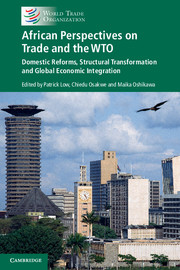 African Perspectives on Trade and the WTO
African Perspectives on Trade and the WTO from Part I - The Future of the Multilateral Trading System: Perspectives from African Policy-Makers and Partners
Published online by Cambridge University Press: 27 October 2016
Structural transformation is imperative for Africa’s economies. An unprecedented policy unanimity has emerged amongst African government and business leaders that to achieve sustained growth and development, Africa must industrialize and secure a greater share of the benefits of its participation in global value chains. This requires further advances in a programme for ‘development integration’ that simultaneously combines market integration with purposeful industrial development intervention and cooperation to strengthen regional value chains, underpinned by efforts to develop and rehabilitate cross-border infrastructure for greater connectivity across Africa.
The recent, generalized decline in global commodity prices has underscored not only the need to reduce Africa’s over-dependence on lower value-added commodity exports, but also the importance of leveraging growing African markets for Africa’s industrialization. Already, the shares of intra-African trade in African countries’ total exports makes Africa by far the second most important export market for most African countries. More importantly, around half of total intra-African trade, primarily within regional blocs, comprises manufactured goods, again highlighting the vital importance of current regional integration programmes for African industrialization.
Africa’s external engagements in the multilateral arena and in bilateral trade and investment must be (re-) designed to support this agenda. At the heart of the argument is the need to secure policy for industrialization, economic diversification and structural transformation. Investment and trade partners that participate positively in this effort will help to initiate a virtuous cycle of trade and investment, growth and development from which they can benefit while also contributing to sustained growth and development across the continent.
To save this book to your Kindle, first ensure [email protected] is added to your Approved Personal Document E-mail List under your Personal Document Settings on the Manage Your Content and Devices page of your Amazon account. Then enter the ‘name’ part of your Kindle email address below. Find out more about saving to your Kindle.
Note you can select to save to either the @free.kindle.com or @kindle.com variations. ‘@free.kindle.com’ emails are free but can only be saved to your device when it is connected to wi-fi. ‘@kindle.com’ emails can be delivered even when you are not connected to wi-fi, but note that service fees apply.
Find out more about the Kindle Personal Document Service.
To save content items to your account, please confirm that you agree to abide by our usage policies. If this is the first time you use this feature, you will be asked to authorise Cambridge Core to connect with your account. Find out more about saving content to Dropbox.
To save content items to your account, please confirm that you agree to abide by our usage policies. If this is the first time you use this feature, you will be asked to authorise Cambridge Core to connect with your account. Find out more about saving content to Google Drive.